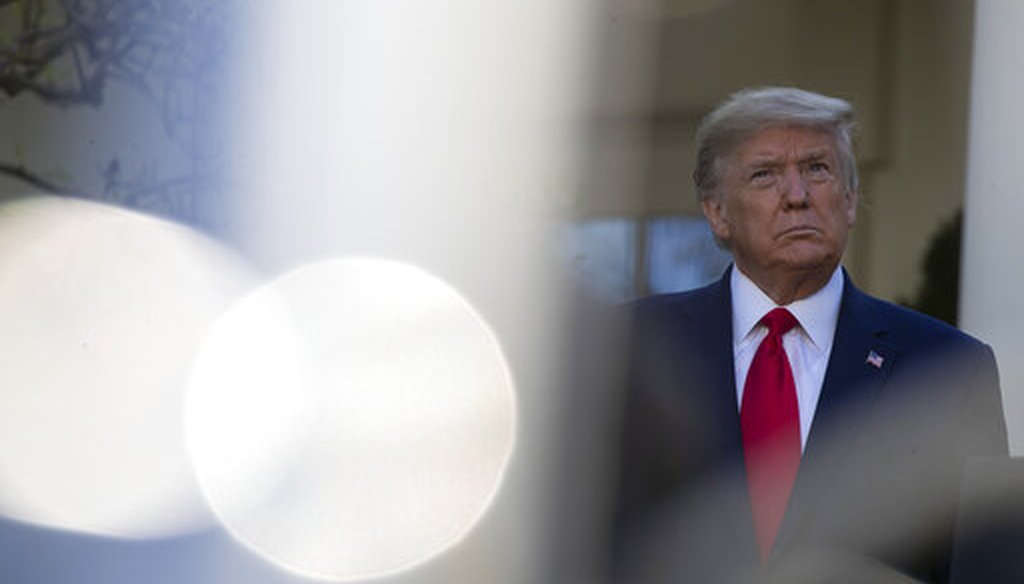Stand up for the facts!
Our only agenda is to publish the truth so you can be an informed participant in democracy.
We need your help.
I would like to contribute

President Donald Trump stands as others speak about the coronavirus at the White House on March 30, 2020, in Washington. (AP/Brandon)
If Your Time is short
-
Trump has used the word “hoax” hundreds of times as president, most often in reference to the Mueller report and his recent impeachment.
-
Recent TV ads have attacked Trump for using the word in the context of the coronavirus.
-
Experts in political science said repetition of a simple word like “hoax” is a way for Trump to portray himself as a victim and mobilize support for his political causes.
President Donald Trump has been tossing around the word "hoax" since before he won the White House in 2016. Now, that favorite term might be coming back to bite him.
Joe Biden and liberal super PACs bolstering his 2020 presidential campaign are using Trump’s own words against him in a flurry of TV and digital ads.
One recent spot from Priorities USA juxtaposed early quotes from Trump downplaying the spread of the novel coronavirus with a graph tracing the exponential growth of U.S. cases.
The ad, like a similar Biden ad before it, featured audio from a February campaign rally of Trump saying the word "hoax" while talking about the coronavirus.
That edit infuriated the Trump campaign, which sent a cease and desist letter to TV stations calling the ad "patently false, misleading, and deceptive." The campaign said the ad "stitched together fragments from multiple speeches" to give a misleading impression.
Sign up for PolitiFact texts
Trump’s comments at the rally were not particularly clear, however. After accusing Democrats of "politicizing the coronavirus," Trump blasted the 2016 Russia investigation and his impeachment in the House — both of which he has labeled a hoax — before briefly turning back to the virus.
"Think of it," he said. "And this is their new hoax."
The next day, Trump claimed he was referring to the Democrats’ criticism of his response to the coronavirus, rather than to COVID-19 itself.
But for some Trump critics, Trump’s habitual use of the word in other instances made it hard to believe he wasn’t talking about the coronavirus.
"We don't trust his next-day clean-up attempt, and he has made many comments in that same vein," Biden campaign spokesman Andrew Bates told us when we fact-checked Biden’s ad.
Is Trump the president who cried hoax? His use of the word while talking about the virus that’s now infected more than 160,000 Americans certainly brought him unwanted attention.
So, we decided to talk to experts about the word and why Trump uses it.
What Trump has called a hoax, and why
Experts in political science told us that Trump uses the word — and others like it — to portray himself as a victim of injustices and inspire his supporters to fight for him and trust his word.
"Trump is trying to undermine the trustworthiness of any source but himself," said Margaret Levi, professor of political science at Stanford University. "The point is to make himself the only credible authority, to be fully trusted as a ‘war-time’ president."
Trump has been throwing around the word since before he took office. According to Twitter and Factba.se, the interactive website that tracks Trump’s public comments and tweets, Trump has used the word more than 600 times dating back to his days as a celebrity.
Many of his earliest uses on Twitter were in reference to global warming, which he frequently bashed as an "expensive hoax." As Trump’s 2016 political opponents pointed out, he once claimed the concept was made up by the Chinese; he’s since said he was joking.
NBC News just called it the great freeze - coldest weather in years. Is our country still spending money on the GLOBAL WARMING HOAX?
— Donald J. Trump (@realDonaldTrump) January 25, 2014
Trump’s reliance on the word took off once he became president. For years, Trump denounced former special counsel Robert Mueller’s investigation of Russian interference in the 2016 election as a "hoax," all the while offering no credible evidence in support of his claim.
The word has stuck with Trump’s supporters and become part of his brand, making it more effective, said Cas Mudde, professor of international affairs at the University of Georgia.
"As many of his supporters believe him on, for example, Russian interference in the 2016 elections being a ‘hoax,’ describing other events with exactly the same term reminds them of the Mueller investigation and strengthens his claim on the new event," Mudde said.
A 2019 report from the Justice Department’s inspector general found that the Russia probe was justified. But Trump has still used the word dozens of times to brand Mueller’s work and the notion that his campaign colluded with Russia, according to Factba.se.
Despite two years and millions of dollars spent, the Democrats are acting like crazed lunatics ever since the results of the Mueller Report were made public. But they knew there was NOTHING even before the Report was started. It is all a big Hoax, the biggest in American history!
— Donald J. Trump (@realDonaldTrump) May 12, 2019
Trump took aim at Mueller’s investigation as recently as March 30, saying in an interview with Fox News that "the whole thing turned out to be a hoax." He has also dismissed warnings from the intelligence community about pro-Trump Russian meddling in 2020 as "Hoax number 7."
Another misinformation campaign is being launched by Democrats in Congress saying that Russia prefers me to any of the Do Nothing Democrat candidates who still have been unable to, after two weeks, count their votes in Iowa. Hoax number 7!
— Donald J. Trump (@realDonaldTrump) February 21, 2020
Repetition like that can be especially powerful, experts told us.
"The word serves as a symbol or signifier that conveys a complicated set of circumstances in a simple way," said Lynn Vavreck, professor of American politics and public policy at UCLA.
That may explain why Trump invoked it again to condemn the House’s impeachment of him for his efforts to pressure Ukrainian President Volodymyr Zelensky into announcing an investigation of Joe Biden, his son Hunter and a debunked conspiracy related to the 2016 election.
In addition to calling his impeachment a "witch hunt," a "scam" and a "coup," Trump has repeatedly used "hoax" to describe the impeachment process and any accusations of presidential misconduct, including most recently during a March 31 White House press conference on the coronavirus.
I hope Republicans & the American people realize that the totally partisan Impeachment Hoax is exacty that, a Hoax. Read the Transcripts, listen to what the President & Foreign Minister of Ukraine said (“No Pressure”). Nothing will ever satisfy the Do Nothing, Radical Left Dems!
— Donald J. Trump (@realDonaldTrump) February 3, 2020
He has also used the word on Twitter to dispute news reports and discredit sexual assault allegations made against him, among other things.
Vavreck said Trump’s use of the word creates a feeling of solidarity between him and his supporters and activates an "us versus them" framework.
"Trump uses it to suggest to his supporters that someone is trying to fool them and they should beware," she said. "It also suggests that he, along with them, is a victim of the effort."
But there’s no fooling when it comes to the coronavirus, which has shut down cities and killed thousands of Americans. Regardless of what he meant, Trump’s mention of a "hoax" while talking about COVID-19 carried different risks than his usual weaponization of the term.
Matthew Kavanagh, assistant professor of global health at Georgetown University, said Trump’s use of the word "hoax" in the context of the coronavirus was "very dangerous" given his history of challenging the veracity of the media and the trustworthiness of public officials.
That’s because public trust is crucial for fighting outbreaks of disease like the coronavirus, Kavanagh said. "Success against the pandemic depends on people believing and complying with the advice of public health officials as seen through the media," he said.
Kavanagh noted that a poll conducted in mid March found fewer Republicans taking precautions related to the coronavirus than Democrats, and that some Republican governors have been slower to take statewide actions to mitigate the spread.
"I worry that President Trump's early statements encouraged local Republican-led governments not to take the threat seriously," Kavanagh said.
Our Sources
Donald J. Trump on Twitter, accessed March 30, 2020
Factba.se archives on Donald Trump, accessed March 30, 2020
Kaiser Family Foundation, "State Data and Policy Actions to Address Coronavirus," March 30, 2020
The Guardian, "Disunited states of America: responses to coronavirus shaped by hyper-partisan politics," March 29, 2020
Kaiser Family Foundation, "KFF Coronavirus Poll: March 2020," March 17, 2020
The New York Times, "Trump Dismisses Warning of Russian 2020 Meddling as a Democratic ‘Hoax,'" Feb. 21, 2020
PolitiFact, "Ad Watch: Priorities USA on Trump’s coronavirus response," March 27, 2020
PolitiFact, "Ron DeSantis doesn’t want a statewide stay-home order in Florida. Health experts say he should," March 27, 2020
PolitiFact, "Ad Watch: Biden video twists Trump’s words on coronavirus," March 15, 2020
PolitiFact, "No evidence FBI officials' texts deliberately erased, as Donald Trump said," Dec. 19, 2018
PolitiFact, "Yes, Donald Trump did call climate change a Chinese hoax," June 3, 2016
PolitiFact, "What Donald Trump said about the Chinese inventing the 'hoax' of climate change," Jan. 24, 2016
Email interview with Matthew Kavanagh, visiting professor of law and assistant professor of global health at Georgetown University, March 31, 2020
Email interview with Margaret Levi, director of the Center for Advanced Study in the Behavioral Sciences and professor of political science at Stanford University, March 30, 2020
Email interview with Cas Mudde, professor of international affairs at the University of Georgia, March 30, 2020
Email interview with Laura Stoker, professor emerita of political science at the University of California, Berkeley, March 28, 2020
Email interview with Lynn Vavreck, professor of American politics and public policy at UCLA and a contributor to the New York Times, March 28, 2020


























